Canned
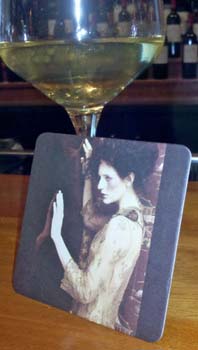
(The new Willow Waif coasters at the bar. What are writers supposed to take notes on? Photo Socotra.)
Everyone was bracing for what is going to come at the end of the week. Mother Nature is going to open up a can of humidity and warmth- the heat index is supposed to spike up over the century mark and the sweat is going to roll down the insides of our sodden shirts and make the bright floral prints of the sun dresses cling damply to the curves of the ladies.
It was starting to get sultry already. There were two civilians parked at the end of the bar in Old Jim’s place, and I knew there was going to be trouble if they didn’t finish their wine and move on. I was surprised to see both the Johns- with and without H- chatting about midway down the long dark bar.
Elisabeth-with-an-S was topping them up with Happy Hour White, and turned and smoothly grabbed another tulip glass to place in front of me on the new Willow coasters that feature the gaunt heroin-chic lady whose image graces the inside entrance in the glass atrium of the building.
“Hey,” I said. “You are getting some hours this week. And what’s up with the coasters? What am I supposed to write on when I am interviewing Admiral Mac?”
“Maybe you should bring your own paper,” said Aimee crisply as she walked by with the check for the civilians, who apparently were lightweights and leaving after a single glass of wine. Aimee is fitting in, and I can only describe her as having an acid wit like Rhea Perlman on Cheers only better looking.
“You had better knock them back, Boys” said Elisabeth. “It is going to get busy here soon.”
“It is always busy,” I said, taking a deep draught of the crisp cold white. “That’s why we flirt with you when we get here because you don’t pay attention later.”
“No,” she responded with that sly shy smile she has. “The Dames are coming.”
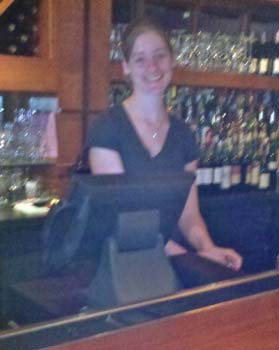
(Elisabeth-with-an-S preps for the coming Willow Happy Hour. Photo Socotra.)
“What?” I said cleverly, then launched into the song from South Pacific. “There is nothing like a Dame…nothing in the wooooorld….”
John with an H joined in: “There is nothing you can name….”
Jon without concluded “That is anything like a Dame.”
“Don’t get out of control,” said Aimee crisply. “Les Dames d’Escoffier is no laughing matter. Owners Kate and Tracy both belong and this is the Spring General Meeting for the DC Chapter of the Dames.”
“What is it?” I asked. “A cooking group?”
John with said: “You know Escoffier, don’t you?” John is of the ancient tribe of WASPS from Boston, washed up here in DC with some vague job at Main State in the aftermath of the overthrow of the old social order.
“Of course,” I said. He was the man who brought haut cuisine to London and then America. Didn’t he do the basic cookbook for French cuisine? I think he cooked in New York, too.”
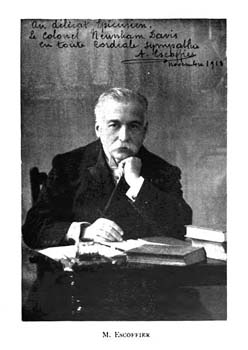
(August Escoffier in his prime. The famed chef eschewed any canned ingredients in his legendary gastronomy. Photo courtesy Les Dames D’Escoffier.)
“He was a rock star of cooking,” said Johnwith. “He cooked for Kaiser Wilhelm onboard the Hamburg-America Line SS Imperator coming across Atlantic after a gig at the Carlton Hotel in London. The meal was sumptuous, and featured the Kaiser’s favorite strawberry pudding, which Escoffier named fraises Imperator. Willie was so impressed that he summoned him to have breakfast the next day and you know what he said?”
“Do tell,” I said, hoping Elisabeth would be attentive to our just requirements for re-fills. There were women coming in groups through the front door, filling up the cocktail nook and the aisle between the bar and the little tables. They were well-dressed, well-coiffed and all business.
“Well, the Kaiser said to Escoffier: “I am the Emperor of Germany, but you are the Emperor of Chefs.”
“No shit.”
“For real, or at least that is what they say.” Aimee slid a piece of paper across the bar.
“Here is what you are dealing with,” and she glided off. Aimee glides. Elisabeth bustles. Moved the paper to a place near the coaster and between the Jo(h)ns. There was a mission statement:
“The Dames D’Escoffier is a world-wide philanthropic society of professional women leaders in the fields of food, fine beverage and hospitality. The invitation-only membership, composed of 28 individual chapters across the United States, Canada and the United Kingdom, is highly diversified and reflects the multifaceted fields of contemporary gastronomy and hospitality.”
“Impressive,” I said. “No men.” The Jo(h)ns nodded, and with the civilians gone, Old Jim assumed his traditional position anchoring the entrance and we slid down to consolidate space as the bar filled with highly diversified and multifaceted women. One of them stood exactly as tall as your average floor lamp, and her head was adorned with the most extraordinary scarlet hat. I excused myself to ask her if I might take a picture for tomorrow’s story.
“Story?” she said with a wondering look.
“It’s sort of a blog,” I said. “Canned ideas. It is a marvelous hat.”
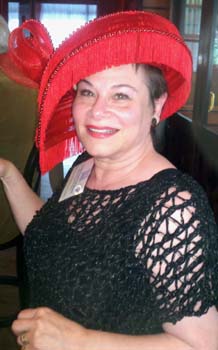
(A lovely hat at Willow. Photo Socotra.)
Slightly disconcerted, she gave her permission and I snapped the pic and uploaded it to the web. When I returned to my place at the bar, John said: “Look at the menu for tonight after drinks:
Willow Dinner Menu:
Wine Service
Passed Hors d’oeuvres:
Willow’s Assorted Grilled Flatbreads
Gougeres with Black Truffle Butter
Endive Spears with Blue Cheese Mousse and Candied Pecans
Dinner Buffet:
Mixed Greens Salad
Orange Glazed Chicken Breast
Grilled Beef and Norwegian Salmon Kabobs with Eggplant, Fennel, Zucchini, and Onion with Feta Raita
Barley Risotto with Summer Vegetables
Garlic-Roasted Broccolini
Assorted Petit Fours and Cookies
Coffee and Tea Service
“Man,” I said. “I wish I were eating here. It is a tribute to Escoffier. I wish I didn’t have to swim when I get back to Big Pink.”
“You don’t have to do anything, Vic,” said Jon.
“True enough. But the exercise is what keeps me sane.”
“Aimee!” bellowed Jim. “Can I get a Budweiser here?” The din was rising, and John With left for the head. I turned to Jon without and asked him what was new.
“Well,” he said slowly. “I got fired today.”
“What?”
“Yeah, HR was waiting for me this morning when I got in. Never saw this one coming.”
“Did they escort you to the lobby and take away your badge? I had to learn about how to lay off personnel when I was at the Phone Company, and the precautions you have to take to ensure that they are not armed when you tell them.”
“I wasn’t packing, and they were very nice. I filled a box and left. I got a chance to go to the pool this afternoon.” The Lovely Bea arrived, striking even amid the throng of attractive women. She had no hat.
“Does Bea know? Wouldn’t you prefer a guy who is employed?” I said with a smile.
Jon said: “I got fourteen weeks severance. I think I will be OK. I think.”
“A guy as handsome as you? Hell yeah. Just keep working on the George Hamilton tan and you will be fine.”
We drank another glass of wine, and Jon and Bea decided to go to dinner someplace else. I spent a moment talking to Old Jim about his time in the Nixon White House. For a guy who got high with Dr. Hunter S. Thompson, Jim sure got around. Of course, the Doctor used to hang out with Nixon, too. Those were odd times.
I gave Elisabeth my credit card and she bustled off.
“You know the other thing Escoffier said?” asked Jim.
“No, what.”
“He said that the Brits were crazy. He had to put out High Tea at the Carlton in London, but it caused him real pain. “How can one eat jam, cakes and pastries, and enjoy the king of meals an hour or two later!”
“That’s why I didn’t have the miniature fish and chips,” I said. “See you tomorrow.”
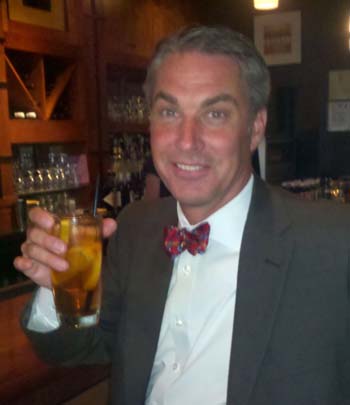
(Jon-no-H with his signature iced tea & vodka with 14 weeks severance, starting today. Photo Socotra.)
Copyright 2011 Vic Socotra
www.vicsocotra.com
At Day’s End
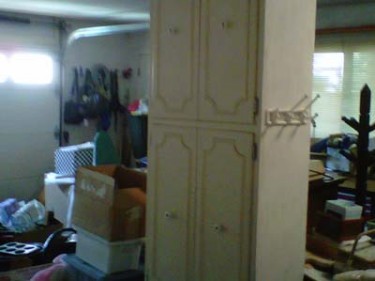
(Garage of the house in the Little Village by the Bay. Photo Annook.)
She cried. Damn.
From all the traffic I read through the day on all the devices, and through the phone calls I received it was apparent that Annook had a busy day. It was bizarre. All the calls happened in pairs; no more than the desk phone would go off with someone pleading for inclusion on the attempt to win the new glittering government contract than the cell would erupt.
It was downright eerie. Everything simultaneous, nothing in a neat line. Like:
“I think we have the team pretty much set and while I appreciate your capabilities…” Ring tone from cell goes off in pocket. “Hang on, have to put you on mute…”
“Hey Kiddo, what’s up?”
“No, that’s fine. Get the washer and dryer. Whatever you want. Oh, you did? OK, I will figure out how we pay for it.”
Stab at the mute button. “And as you know, we expect a final RFP from the government this week, so I will have to ask you to stand by until after award…” Cell ring tone. “Hang on…sorry….”
“Hey Kiddo…”
It was Annook calling, mostly, in the chaos of the Little Village by the Bay amid bank and washing machine issues, and personal hygiene crap that makes my skin crawl, but my younger boy called, too. His class at Basic School got their orders today.
“So where are they sending you?” I said, thinking of all the places the Navy operates on this wide world, and all the exotic possibilities.
“Suitland, Maryland,” he said. “They are sending me home, almost.”
I remembered my first visit to the complex there, just outside the District’s Ward Eight boundary, and the loading dock-exit from the Naval Operational Intelligence Center and walking across Suitland Road to the Cedar Hill Inn for beers and burgers at lunch a gazillion years ago.
Remember alcohol at lunch? And before there were security fences around the government reservation and all sorts of things happened there in the darkness?
“Well,” I said to my son. “You know the saying. It’s not just an adventure. It’s a freaking job.”
Then turning back to the computer and plowing through endless business email. A video call from Afghanistan; it was the middle of the night there, a bored watch-stander with an update on volleyball in the compound.
Then, checking the late mail, I saw that Annook had written to sum up the day:
“The carpenters were back. Today’s goal was to lay the wood floor for the kitchen. Annook confirmed the island would have the same marble top the counters were getting. Annook also confirmed the crew would put dimmers on the kitchen lights.
Annook asked what exactly the laundry room would look like.
“I’ve got your picture right here,” he said, gesturing at a piece of paper. “The water tub goes here, and the cabinets all along the wall here.”
“Are the cabinets white like the ones in the kitchen?”
“No – er – I guess I don’t remember. But white? No, I don’t think so.”
“And the marble counter top – that is continuing here from the kitchen?”
“No – we have a top that matches the stone floor. Durable for all things that happen in a laundry room.”
Annook was sorry there wouldn’t be continuity between both rooms with the cabinets – but was glad the rusty metal cabinets were gone. They were two separate rooms, so it probably didn’t matter one bit. The painting crew had painted the built in side cabinets white.
Annook loaded the car with 5 big bags for Goodwill and put a suitcase with things for her mother in the trunk. Annook looked at the driveway and saw – much to her chagrin, she was blocked in – again. This never happened with the painting crew. This has happened 5 times with the carpentry crew. Annook went in to talk with the son of the head carpenter.
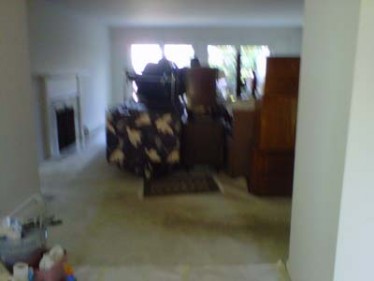
(Living room chaos. Photo Annook.)
“Do you need something?”
“I grew up with brothers. I just want to share with you a girl pet peeve.”
“I’m sorry – what can I do for you?”
“I think we have one of the largest driveways in Petoskey.”
“Yes.”
“I think we can fit 20 cars in our driveway.”
“Yes.”
“So I am dumbfounded that once again my car is blocked in by another car in our driveway.”
“I’m so sorry – I was going to move it.”
“I’m sorry, too. I hate to be bitchy – but we have such a large driveway. I don’t understand why this is an issue.”
“I’ll move the car right now.”
“I really like you –I just don’t understand the testosterone.”
“What?”
“Never mind. Thanks for moving the car.”
Annook bid the crew good-bye and headed for Sears. Annook picked out a washer-dryer set for the laundry room.
Annook moved on to the bank. Annook converted Big Mama’s debit MasterCard, as per her brother’s wishes, to the savings account at her bank.
Annook moved on to Potemkin Village. Big Mama looked up as she blew through the unlocked apartment door.
“Annook – there you are! Where have you been!”
Annook told her mother she had been away – as she had told her Saturday – for a day and a half.
Annook then loaded the elders into the green car and drove them to the fancy supermarket with the Starbucks in the front. Annook got them vanilla bean frappachinos and fresh muffins and sat them down in the cafeteria. Annook then went shopping for the house and Potemkin Village. There were lots of samples at the market today. Annook brought back lots of treats for Big Mama and Raven.
Annook drove them back to town and stopped by the Laundromat to pick up her newly washed/dried clothes. Big Mama and Raven sat patiently in the back of the car.
As Annook took them back to Potemkin Village, Big Mama got into everything about Son #1. Big Mama wanted to know about whether or not Son #1’s two sons were involved with good women and if there were getting married. Big Mama wanted to know about Son #1’s fiancé and what was happening with her. Big Mama wanted to know, wanted to know, wanted to know, wanted to know…..
“I don’t know, Mom. I spend most of my time talking with my brothers about the two of you.”
“Well.”
Annook dropped them off and went to the Senior Center. Annook signed up Big Mama for Senior Assistance.
“She stinks.”
The Friendship Center said they would call with a plan for Big Mama.
“She’s gonna hate this.”
Annook did email and union business and then headed back to Potemkin Village. Annook came to the apartment and found a RA frustrated with Raven for not wanting to get up and go to the bathroom.
“Come on, Dad. You have to go to the john. Chop chop.”
After a period of time – not short but not long – the RA succeeded and Raven and Big Mama and Annook headed to the cafeteria annex reserved for the challenged. Big Mama had been in and out of reality since Annook’s afternoon arrival.
Big Mama had said she was starving, but wouldn’t dig into her jello/fruit salad. Not so with Raven. When the main meal came to the table, Annook was relieved there was a nice piece of white meat chicken breast on Big Mama’s plate. On the other hand – Raven had a chicken leg on his plate.
Annook took the meat off the bone and cut it into pieces. Annook had no idea how Raven would have eaten the meal without assistance from someone. Raven dug in.
Big Mama was more concerned on the social aspects of what was happening people wise in the dining room. Who was this person, why was that person sitting at another table. Who was that with the hat with the ribbon?
Annook pointed out that Big Mama had said she was starving, but wasn’t eating.
For the first time in her life, Annook got up and went to her mother’s chair and picked up her knife and fork and cut up her mother’s plate of food. Big Mama looked conveniently elsewhere, and did not protest the assistance from her daughter.
Annook, upon writing this, cried.
She ate.
Copyright 2011 Annook and Vic Socotra
www.vicsocotra.com
“D” as in Dog
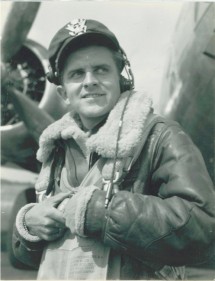
(Captain “Dick” Gile, USAF, 1944, at Lavenham, East Anglia around the time of D-Day.)
I suppose it is a good thing, from a public health perspective, that they have banned smoking in bars, but the scribbling on the napkins made me want to light up a Lucky. I put down my pen and looked over at Mac, who had knocked the delicate tempura onion rings off the stack of lightly battered haddock, calamari and shrimp.
“Do you think anyone remembers D-Day?” I asked. “Midway was the biggest naval triumph since Trafalgar, and no one seems to give a rat’s butt anymore. The kids don’t even know what it was.”
“Monday will be the sixty-seven years for the landings at Normandy, sixty-nine for the anniversary of the fight off Midway Island. I expect the fact that the invasion happened in a place you can drive to from Paris makes it a little more accessible to the tourist trade,” said Mac. “Only to be expected.”
“I always think of Uncle Dick launching in his B-17 out of RAF Lavenham in East Anglia to go after the bridges behind the lines. They had to keep the panzers from reinforcing the coastal defenses, or the invasion could have been tossed back into the sea. He lost an engine on take-off but went to the target anyway.”
“There were acts of courage everywhere,” said Mac, his blue eyes looking at someplace far away I could not see. “The ability to penetrate the Axis codes was crucial to defeating the Nazis.”
Big Jim the bartender waved the bottle of Chardonnay over my tulip glass, keeping me on an even keel.
“We agreed we are not going to talk about your second career, right?”
“Yes, there are some things that are still a little sensitive after all these years.”
“Like Azorian?”
Mac shook his head. “Nope, not going to go there. But I can talk about Bronson Tweed. He was old school CIA, and the strong right arm to Director of Central Intelligence Richard Helms.”
“Helms was Director for longer than most, wasn’t he?”
“Yes,” nodded Mac. “Mid-sixties right up to 1973. He was old school. He had been Naval Intelligence in New York City, working on the Eastern Sea Frontier plotting U-boats when a friend approached him to join the OSS’s Morale Operations Branch. They did the black propaganda. He was a Spook the rest of his life.”
“It is interesting that the Navy reservists in New York were in the middle of everything, isn’t it?”
Mac smiled. “They were their own Navy, that is for sure. They ran the Lucky Luciano connection with the Mob to keep the docks safe from Axis saboteurs.”
“In real life a lot of them were prosecutors and cops and stuff, right?”
“It was all mixed up together, and actually sort of a parallel universe.”
“They ran the scientific exploitation of the former Nazi scientists out on Long Island after the war.”
“Yes, the projects that came out of the Castle were of extraordinary value to CNO Arliegh Burke, who was creating the Nuclear Navy in the 1950s.”
I picked up the pen again. “So, after the Pueblo Damage Assessment you were Chief of Staff at DIA for two years?”
“Yes,” he said, contemplating his Virgin Mary.
“And then you retired at the end of 1972 and went to work at the F Street Building down the block from the OEOB at the Intelligence Community Staff?”
“Not at first, and that wasn’t the name. I think we were in the Original Headquarters Building at Langley. But I am going to need to back up for a minute. I was still on active duty in the fall of 1972. Bud Zumwalt was on a tear to get every admiral who had been senior to him to retire. I didn’t want to, but the CNO wanted my number to promote Rex and that is just the way it was. There was no animosity between us; Rex was his guy and that is who he wanted.”
Old Jim was signaling for additional Budweiser and Jon-no-H was contemplating his vodka and iced tea.
“It was in October of that year that I was approached by Bronson Tweedy, who was Helm’s Deputy and very much like him. He was born in London to American parents; He went to school there, and lived with a family in Germany. He arrived to start his visit the day Adolf Hitler became chancellor. He was a Princeton guys were. He had a degree in European history, and went into the advertising game at Benton and Bowles on Madison Avenue before the war. In 1942 he volunteered for naval intelligence and served in North Africa and Europe interrogating captured German U-boat crews.”
“Naval Intelligence again,” I said in wonder. “You know, there are still things that people don’t want to talk about. I was working on a story about a counterfeit ring in France in the 1950s and touched a live wire. It might have had something to do with Luciano, but I don’t know and I was smart enough not to ask.”
Mac nodded, neither confirming nor denying anything. “After the war, Bronson briefly returned to advertising before being recruited by the CIA. He served in Switzerland, and DC just as the Agency was bing formed, and was CoS in Vienna and twice in London. Then he founded the Africa Division, which was a result of Eisenhower’s dislike for Patrice Lumumba.”
“Did he have anything to do with the coup and Lumumba’s death? I remember the revelations about the rubber gloves and the lethal toothpaste they were going to slip into the Presidents bathroom. It was as cool and crazy a plot as the deadly cigars they were going o try to get Castro to smoke.”
“I assume. Lumumba did have a brilliant smile, from what I recall. He died right before John Kennedy was inaugurated, and Bronson was in Leopoldville around that time, but we never talked about the things that later came to be known as the Crown Jewels. After that, he was tapped to head the Eastern European Division. When Dick Helms was confirmed as Director in 1966, Bronson moved up to be Deputy.” Mac scowled.
“You have to remember that Dick Nixon was not a big fan of the CIA. He and National Security Advisor Kissinger looked down on the analytic capabilities of the Agency. When I was Chief of Staff at DIA, Doctor K took the surprise of the 1970 coup in Cambodia personally. There was a lot of tension between Langley and the White House.”
“Interesting,” I said. “So what was it that Bronson wanted you to do for Director Helms?”
Mac smiled and popped a piece of haddock into his mouth. “I would have to tell you about the Schlesinger report to explain that,” he said. “And that might take another happy hour at Willow.”
“Damn the bad luck,” I said, and waved at Elisabeth-with-an-S for the check.
Copyright 2011 Vic Socotra
www.vicsocotra.com
Damage Assessment

(The Nebraska Avenue Complex in NW DC. Building 3801 is to the upper right. Photo GlobeXplorer.)
“I am headed up to NSA tomorrow,” declared Mac. “They have asked me to talk about Station Hypo at Pearl, and the contributions of code-breaking to the victory at Midway.”
“That is Saturday the 4th, right?” I said, waving to Elisabeth-with-an-S for more Happy Hour White. She brushed a lock of chestnut hair over her ear and nodded. The Willow bar was rocking. Food was arriving in front of the throng at the bar, and Mac and I were midway down the rail.
Ray and Old Jim anchored the L by the door with Jon-no-H, the Lovely B and Short Hair Mike. Jake was talking to The Greek and Jeff further down the line. It was a good crowd, and it looked like Willow was doing a land-office business.
“Yes, they are going to have the ceremony on the third, to commemorate the 69th anniversary. I imagine they are going to have something really big next year for the 70th. They were going to do it in the headquarters, but they changed the venue to the base theatre, which can hold around four hundred people.”
“You are about the last man standing,” I said. “That is really something.”
“Well, that may be true but I had NSA arrange a wheelchair for me. I told them I’ve walked those endless halls in the Headquarters!”
I had forgotten my notebook and was back to napkins. I fished out my pen, took a deep draft of delightful crisp Happy Hour white.
“So,” I said, launching into my list of questions. “At Building 3801 at Nebraska Avenue they put together everything they knew they had on the ship. They had way more than they should have- the classified pubs officer said they were going to get around to purging things but didn’t have time, according to the Board of Inquiry.

(Pueblo sailors flip off their North Korean captors for the camera. Photo courtesy DPRK.)
“They did not have thermite grenades. CDR John Lacey at COMNAVFOR Japan had been very thorough in providing Pueblo with all the Fleet Intelligence Collection Manual and the Special Intelligence Collection Requirements documents, even if they had nothing to do with Korea.” Mac frowned.
“They got the FICM and all the SICRs? For the whole Pacific?” I said in wonder.
“Yep. Plus, we had to assume that everything that had been sent on the Fox Broadcast during the deployment. That is what we called the Special Intelligence net, and all the traffic would have been retained in the files. Not to mention the hardware- radios, cryptologic equipment and the codes to go with it. The whole shooting match.”
“Damn,” I said. “That is about the whole shooting match of how we do business. Who did they give you to work through it all?”
Mac pursed his lips. “I had good talent. NSA and the Navy Security Group were there, of course. I think, Joe Amato was there, and ONI gave me Bill Harris, and there was that gay Counter-intelligence guy. Everyone knew, but it was still sort of odd for the early 1970s.”
“Being a counter-intelligence officer is a good place to be gay in, if your organization considers it criminal.”
“True. And then there was Wanda. She was fresh to the agency- early twenties, and she was a knock-out. She used to wear those mini-skirts to work. She did everything- typing and admin work and every day she would sweep up- she was a thrill to watch!”
Jake asked: “When did you last see the Damage Report? I know there was still a copy at CNO- Intelligence Plot when I was there. Someone wanted to clean it out, since it was taking up space in the vault.”
“We don’t care much about our history. All those special submarine base mission reports were retained on microfiche, and they are disintegrating.”
Mac cleared his throat and took a sip of his Virgin Mary. “We gave the assessment to General Joe Carroll, the first Director of the Agency. He headed the DIA from its establishment in 1961 as a special unit to coordinate the intelligence activities of the separate services until he retired in 1969.”
“Eight years. That is quite a run.”
“He was an odd duck, that is for sure,” said Mac. “He was fierce about protecting Air Force equities, which is why I was Chief of Staff and not the Deputy. Anyway, there were enough copies for him and the USIB- the United States Intelligence Board. Back then it was State, CIA, the Services, no Marines, though John Guenther changed that, NSA, COMIREX…all the INTs were represented.”
“General Carroll presented the report. He always went to those meetings by himself.”
“Director Bennett made me Chief of Staff. We had a tight relationship- he said “I am going to be Mr. Outside and you are going to be my Mr. Inside.””
“Now, in those days there were three uniformed officers in the leadership chain. The Number Two guy was an Air Force three-star named Philpott. General Carroll lobbied hard to get a Zoomie as number two. Rufus Taylor at Navy tried to influence that, or to have me assigned as the director of analysis, but Carroll was having none of it. He left in 1969, and that is when General Bennett came in.”
“Were you friends with Vice Admiral Taylor?”
“Oh, yes, we were great pals. We were together at Arlington Hall in the predecessor organization to NSA- the Armed Forces Security Agency. One day we went for a walk and he told me he had been thinking about his future.”
“Didn’t he start out as a Cryppie?”
“That was the point. He was thinking about applying for a lateral transfer to Intelligence, and I told him it was a good idea. He was the only Navy officer who ever switched communities and he did pretty well.”
“No,” I said. “He was the first, but Jerry Clark did it later. He wound up as the civilian Deputy at DIA after he retired from the Navy.”
“Still unusual,” he said.
“Well, considering you started out doing code-breaking for Joe Rochefort at Station Hypo in Pearl Harbor, you could have been either one.”
“And now they are mixing everything up again,” he said.
“They think the Radio Wars are over.”
“Maybe they are. We’ll see.”
“So were you working full-time on the Damage Assessment for three months?”
“Goodness no. I would spend the morning in the Pentagon going to budget meetings and then go over to Nebraska Avenue in the afternoon. The Program never sleeps, you know, and I was the DIA-PL. General Carroll had an acronym for everything. The title was “DIA Plans and Program.” We called it Diapple. I had a good Air Force Colonel working for me, and together we were able to cover it while still producing the Assessment.”
“I remember when I was Staff Director. It was all about meetings. It was excruciating.”
“I hated plans and programs. When General Bennett came in he made me Chief of Staff.”
“That is still a lot better than doing the Program,” I said with a shiver. “Although I have to say that learning how the money flows was pretty useful after I retired.”
“Philpott was the most worthless officer I ever knew on active duty,” said Mac with a scowl. “There was never a thing on his desk except his feet. His in-basket was the top right drawer on his desk. Didn’t matter what time of day you went in. That desk was clean as a whistle.”
Bennett had been a European commander- never had been to Vietnam, even though he had a great combat record. He was in the second wave at D-Day and his unit took 50% casualties.”
“But he was Fulda Gap Army,” I said. “Focused his whole career on the Group of Soviet Forces in Germany.”
“Exactly. He did not know a lot about the Pacific. So, early on in his tenure he said he was going to go to Theater and talk to all the Commanders in every Corps area. I had just come from PACFLT, so he left that idiot Philpott in charge and took me along to interpret for him. We went to all of them for at least a night. The Marines at Da Nang were the only non-Army units we talked to until we got to Saigon.”
“That is where the mystery happened, right? I still don’t understand that one.”
“Oh, you mean when I saw Captain Rex Rectanus at dinner with Admiral Zumwalt at NAVFOR-V?”
“Yes. That still freaks me out. Rex transferred from Vietnam back to the Hoffman Building in Alexandria the year before that trip to be the collections requirements officer for the Director of Naval Intelligence.”
“But I saw him across the table from General Bennett that night when we visited in 1970.”
“That does not make any sense,” I said. “I have talked to the guy who relieved him. He does not recall Rex being back in country, though he thought he was up at Long Binh when you and the Director of DIA were there.”
“Well,” said Mac thoughtfully “There is the possibility that there was something that required Rex to be back there.”

(CDR Jack Graf in Vietnam, 1969. Official Navy Photo.)
“You mean the Jack Graf affair?” I said. “I was proud to help Admiral Rex on his campaign to have Jack memorialized as the only Naval Intelligence Officer to be captured and killed while trying to escape captivity.”
“There were reports of his being held alive during that period down south in the Delta.”
“There were some very strange things about the whole story, though.” I drained my glass of wine, and felt exactly at that place you want to be at Willow: light, but not weightless. “It was a matter of supreme importance to Rex, and the more I found out about things the stranger it got. You know the Naval Intelligence Liaison Officers assigned to the River Divisions and field units normally did not have the really special clearances in case something happened to them.
“Yes,” said Mac. “What you don’t know cannot be compromised. It is a lesson we should have learned before Pueblo.”
“That is my point, Admiral.” I shuffled the stack of napkins on the bar in front of me. “When I was doing the research into Jack’s career, I found out he was one of the first officers sent to the special school at Kodak. Jack had been photo interpreter at Building 213 at the Navy Yard.”
“Yes, the National Photographic Photo Interpretation Center, which at that time was the only place that satellite imagery was analyzed. Very hush-hush.”
“Yessir,” I said. “And that is my point. When Jack was there, they were still working with the early satellite systems that had to de-orbit film canisters and snag them from C-130 aircraft.”
“Right. That was the Catch-a-Falling-Star unit out of Hawaii. I knew them when I was the N2 at PACFLT.”
“Well, that was sort of a cumbersome system. Engineers like my Uncle Jim at Kodak were working on something much better. They figured out how to transmit high-quality imagery from space back to earth. That is what was going to revolutionize space-borne reconnaissance.”
“It made satellite intelligence nearly real-time,” said Mac. “It was a huge advance.”
“Bingo,” I said. “And Jack had been to the course right before he volunteered to go back to Vietnam. The whole thing was so secret that the personnel system probably did not recognize what Jack was carrying in his head.”
“So you think maybe the Viet Cong figured out that they had someone really special in their hands?” Mac looked quizzical.
“I don’t know. But I do know there was never a body found, and the only testimony after the war was that he was shot trying to escape. The Vietnamese claimed they buried him in a river bank that subsequently washed away.”
“So you think Rex was back in Vietnam to check into the matter on the QT, so that there would not be a tip-off that something amazing had gone missing?” Mac rose from his stool.
“No body was ever found. Jack could be anywhere. Even Russia.”
“I suppose you are right,” he said as we walked toward the door. “It could be that Rex was back in Vietnam to do his own version of a Damage Assessment.”
Copyright 2011 Vic Socotra
www.vicsocotra.com
Big Mama’s Car
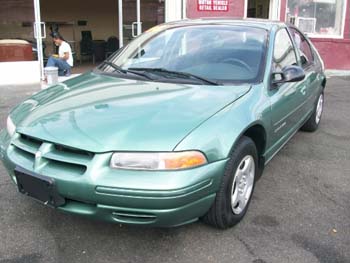
(Big Mama’s beloved 1998 Dodge Stratus ES. Photo Brown Motors.)
Editor’s note: I could barrage you with two stories this morning, but instead will uncharacteristically refrain. What follows is the latest chapter of the continuing adventure of the latest visit to Raven and Big Mama, residents of the Little Village By the Bay, and the travails of the Socotra Sandwich generation, pressed between the Wonder bread slices of children and elderly.
There are eight napkins of conversation with my pal Mac to transcribe, and travel today. This is all Annook, and all hail to her.
Vic
Annook bid a fond adieu to her terrific husband. Husband drove off to get to Chicago where he would get rid of the rental car and jump on a plane to Anchorage, Alaska. Annook thinks husband put at least 3,000 miles on the rental car over the past 10 days.
Husband helped bag endless closet items, got Big Mama’s green car up and running, and added an extender unit to the outside water faucet so anyone might be able to find the garden hose for the front yard. There are several major bushes and plants prohibiting anyone from getting near to the outside house wall.
Husband was still kicking himself for turning off the basketball playoffs before the Mavericks came back and won. Husband had recently acquired the attitude what the Michigan fans have gotten used to – defeat before being defeated.
Annook had called Big Mama in the morning. Big Mama sounded awful from her recently acquired cold. Annook called Potemkin Village and asked if someone could go and give Big Mama an over-the-counter cold pill Annook had left the day before. Annook would be picking Big Mama up that afternoon for a date with the gals. At what they call “Coterie.”
The group has met for decades at the Perry Hotel lounge on Friday afternoons to have coffee, popcorn and gossip.
Many of the Coterie have passed, or moved on to other Friday events. Today would bring at least 10 to the lounge for coffee, popcorn and gossip.
At the compound, the house main floor quarters and baths were now freshly painted. Now it was up to the carpenters to lay the new wood floor in the kitchen, the new stone floor in the laundry room, and replace the sinks and install marble counter tops. The cabinets were getting painted white with new door and drawer faces installed.
Annook was nervous driving Big Mama’s green car over to Potemkin Village. Big Mama was crazy mad when her beloved children told her she couldn’t drive anymore and hid the car from her including unplugging the battery and allowing a tire to be flat.
Crazy mad. Full Big Mama mad. Rather not see Big Mama when she is bully mode.
“I have a driver’s license.”
“Doesn’t matter.”
“I’ll get an attorney.”
“Go for it.”
“I’ll just go buy a new car. I have excellent credit.”
“Good luck.”
“I have a right to drive.”
“Driving is a privilege, not a right.”
“Ridiculous.”
Annook went upstairs to get Big Mama and take her to Coterie. The apartment stank. Raven was passed out on the sofa and Big Mama was in the same clothes she wore for the last three days.
“Big Mama – I told you you had to change your clothes. I told you you had to have a shower. I told you you had to brush your teeth.”
“Where did the day go?”
“Big Mama – let’s go get another outfit on.”
“No, no – this is fine.”
Annook had made an appointment the day before with the Friendship Center to put Mom on the weekly forced shower list. The Center told Annook she had to do an interview and create a needs file on Big Mama. They told her she could do that this upcoming week.
Annook sighed. They were late and she took Big Mama “as is” and went out to the parking lot. The minute Big Mama got out the front door she cried –
“My car! My car! My beautiful car!”
“Yes, Big Mama. It is your car.”
“Is it really? Is it really my car?”
“Yes, it is.”
“Your brother lied to me. He said the car was hidden and the wheels were off.”
“He didn’t lie to you. The car was hidden from you. The car was also made inoperative.”
“Oh. He didn’t lie.”
“No, he did not.”
“My car!”
“Your car.”
“You’re finally giving me back my car!”
“No, I’m finally allowing you to see your car and to allow you to be driven in your car.”
“You’re not giving it back to me?”
“No.”
“This was part of my plan. I knew if I could get you alone, you would get me my car and I could prove to you I could still drive it.”
“That is a good plan, but you will not be able to drive. We fixed the car so visiting family could drive you around Petoskey.”
“Well, that makes sense.’
“Yes, it does.”
“I haven’t driven in a year.”
“I know.”
“It makes me nervous. Maybe I don’t know how anymore.”
“It makes us nervous.”
“My car!”
“Yes, Big Mama.”
“How I’ve missed you, car. Did I have a name for it?”
“I think you did – but I don’t remember it. Raven’s car was Annabell – I don’t remember what you called yours.”
“Hi car. Beautiful car. Did you miss me?”
Coterie went well. Annook was happy to see all the old dear friends of her mother. Big Mama really couldn’t hear very well and she couldn’t really remember all the stories from the trip – but they embraced her in their warmth and loyalty.
When it was done, Annook took Big Mama back outside to the car. They had to get back and relieve the babysitter Annook had watching the sleeping Raven.
“My car!”
Copyright Annook Socotra
www.vicsocotra.com
Mid-Way
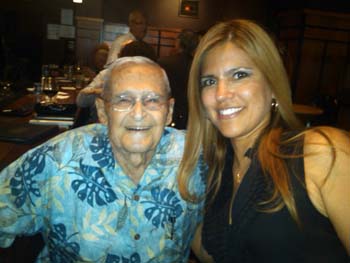
(Mac and the Lovely Bea at the Willow Bar. Photo Socotra.)
Well, some of you expressed concern about the lack of a story yesterday. Many more were relieved to not have to hit the “delete” button. But Mac was mildly concerned, and he said so as I slid onto a bar stool next to him, just down from where Old Jim and Ray the Jarhead were holding court.
Ray, you will be happy to know, is back from foot surgery, and was prepared to make up for lost time at the bar.
“It wasn’t a big deal,” he said. “Middle aged stuff- bone spurs and crap. What’s up with you?”
“A lot,” I said, as Old Jim took a healthy swig of Budweiser.
“I don’t really care,” said Ray with a his crooked smile.
“I know,” I said. “That is why I gave you the short version.”
Jake was midway down the bar collecting a bet from The Greek and Jeff, two Spooks I knew from the Task Force, and with whom I used to see on the weekly VTC with Kabul. The Greek has been hunting Osama bin Laden for a long time, even before the attack on the Towers, and it was time to settle a bet made long ago. They appeared to be doing so in earnest.
I shook The Greek’s hand and asked what the bet had been. “Whether Osama would be killed in Afghanistan or not.”
“So you picked Afghanistan?” The Greek nodded.
“That was the smart money.”
Jake smiled. “I got the rest of the world,” and took a sip of his victory beer.
“But didn’t they drag his body back to Afghanistan for identification?”
“A triviality,” said Jake. “He sleeps with the fishes now.”
“You didn’t write this morning,” said Mac.
“Well,” I said defensively. “I did, but I didn’t publish. I was freaked out by the tornadoes in Massachusetts. The footage of the one you saw on the television that tried to suck the Connecticut River dry could have been shot from the house of our buddies Bonds-and-Donna. There were hysterical people from DC, Michigan, Chicago, Florida and Colorado trying to figure out what happened. I was right there two weeks ago.”
“Are they all right?”
“Yeah, Bonds checked in later in the morning. It was a relief. He wrote one of the funniest notes I have seen in a while about it, but the twister couldn’t have been more than a few hundred yards from his house. There is something going on this season.”
“Last one this violent was back in ’36, when I was just eighteen,” said Mac. “these things are cyclical, but there are a lot more people living in the path of the storms than there were then.”
I nodded and took a refreshing sip of wine. “Then, I was midway to crafting an account of what is going on in the Little Village By the Bay out of some phone conversations with my sister Annook, but in the end it wasn’t that interesting or funny and she does it better herself anyway. She is living the nightmare in person.”
“Well, I am sure she will get to telling the story,” said Mac, finishing his ginger ale. “I am parched from the heat wave, and it is my first time out since the season changed.” He looked up at Big Jim and asked for a Bloody Mary as he poured a rich pale tulip glass of Happy Hour White into my glass.
“A Bloody Mary?” I asked in surprise. “Did you fall off the wagon?”
“No,” said Mac quickly. “Sorry, a Virgin Mary. Still have to watch the medication. It is just good to be out again.”
Tracy O’Grady, Executive Chef and co-owner (with Kate Jansen, the best goddamn pastry maker in town) came down the bar to press the flesh with the regulars. Deborah was bustling around, doing her best den-mother thing with the rest of the staff, and the lovely Elizibeth-with-and-S was hustling to serve the throng out on the patio, basking in the brilliant lowering sun or huddling in the artificial shade of the orange Willow umbrellas.
She was focused, but I wanted to ensure that she knew that Mac was at the bar, since he is a babe magnet. She stopped long enough for me to get a picture as she delivered an astonishing new appetizer Tracy brought back from the restaurant convention in Chicago:
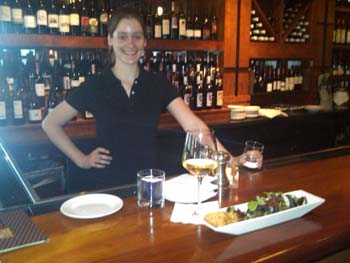
(Elisabeth-with-an-S presents. Photo Socotra.)
“It is sherry and tomato steamed mussels with speck ham, sweet garlic, fennel with ravioli and Basil,” she said. “It is not bad.”
Mac smiled. “I think I will go with the fish and chips from the Neighborhood Bar Menu,” he said. “I don’t want to eat at the Madison tonight. Been there too much lately.”
“There is nothing more amazing in presentation,” I said, reaching for a napkin and taking out a pen. “Now, where were we? We were going to finish the Pueblo damage assessment.”
Mac nodded. “took about three months. We assembled everything we thought they might have had on-board and reviewed it for what was disclosed about our collection priorities. The idiots in Yokosuka had ensured that everything we were interested in was in the inventory, in detail. All of it was compromised.”
“Was there any suspicion that the Russians put the North Koreans up to attack in order to get the KW-7 coding machines?”
“Oh, my no. It wasn’t until they caught that bastard john Walker that we knew that they had the keymat material. We had to assume that the crew did what they were supposed to and destroyed the enciphering machines and the keying material. We didn’t actually get to interview the crew until they were released the next year.”
I was scribbling frantically on the napkin in front of me.
“That was the Board of Inquiry they held out at the Amphib base in Coronado, right? My pal The Lawyer used to skate out of his JO job on the cruiser on the 32nd Street waterfront and attend the hearings.”
“Vice Admiral Harold Bowen was the President of the Board. He was Deputy Director of Naval Intelligence as a tin-can sailor. That was unusual. Dick Bates was his Special Security Officer, sent out there in case any codeword material came up in testimony.”
“Did they ask any of you to testify?” I asked.
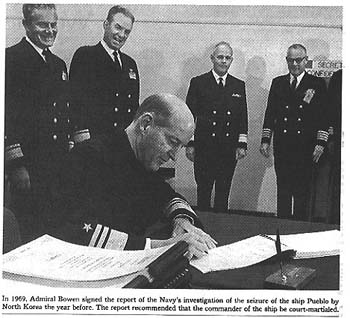
(San Diego Union photo of VADM Bowen signing the report of the Pueblo Board of Inquiry. Photo San Diego Union from Official US Navy source.)
“No,” said Mac dryly. He fished in the pocket of his Aloha shirt for a ancient scrap of newspaper and pushed it across the bar. “This is the admiral signing out the Board’s report. He wanted Bucher court marshaled. SECNAV Chafee reviewed the recommendation and ruled that no one would be punished. He said that the Pueblo officers “have suffered enough” and that the inability to anticipate the attack reflected a general failure in the Navy command.”
“So everyone was responsible and no one was.”
“You got it,” he said with a thin smile. “Dick Bates never forgave the Pueblo’s skipper, Lloyd Bucher. He felt that he surrendered his ship without a fight. He could have been as big a hero as Lawrence, but instead he gave up the ship.”
At that very moment, the lovely Bea arrived, just a few minutes ahead of Jon-with-no-H. I waved her over to meet the Admiral. “Bea, I would like you to meet the last of the Midway Code-breakers, Admiral Mac. He was part of the team that broke the codes to enable the great victory at Midway in 1942. The anniversary is coming up on June fourth.”
Bea turned on that dazzling smile. “I had an Uncle who was there. He landed in Normandy.”
Mac just smiled. Like I say, he is a babe magnet.
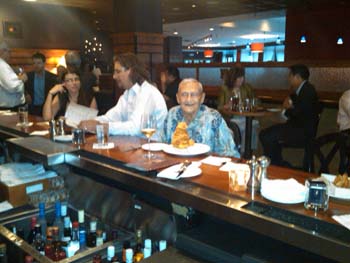
(Mac with fish and chips. Photo Socotra.)
Copyright 2011 Vic Socotra
www.vicsocotra.com
The Chaperone

It seemed that all was well with the traveler‘s from Petoskey- the little village by the bay- and afar.
The previous day had found Annook, Big Mama, Annook’s family and seven other displaced Alaskans gathered together at a family styled diner in Niagara on the Lake, in Canada. All had breakfast, then some went wine tasting, some went to the falls, some went to a matinee at the Shaw Festival.
Eight attended MY FAIR LADY that evening at the Festival Theater. The musical was terrific. Annook bought a CD of the original Broadway musical production. At intermission the outside was wild with lightning and thunder. When the gang left the theater, they found the whole city was in darkness.
Annook, not feeling well and Big Mama who is not well, went back to the hotel and were given candles for their rooms. The rest took off for the light show at Niagara falls – hoping there still was a light show at the falls.
Alas, the adventurers found no light display at Niagara Falls. They came back to the hotel to find Big Mama had jammed her hotel door open (why, not known) and Annook with hundreds of blown tissues surrounding her, fast asleep.
The original four packed up the car the next morning and headed East for Windsor and the tunnel to Detroit. The gang sang MY FAIR LADY most of the way across Canada. The car pulled into the customs line at the border. This was when everyone looked at each other and hoped they were not going to be forced to leave the soon to be 87 year old Big Mama by the wayside in Canada.
Clear signage at the border crossing said you needed a Passport or a Passport card. Nowhere did it say you could get through with a driver’s license and a birth certificate. All they had was a driver’s license and a birth certificate for Big Mama. The car inched forward.
The events of the past 5 days proved this could go either way and still keep to theme with the vacation.
“Could you all take off your sunglasses?”
“Yes, sir.”
“Yes, sir.”
Yes, sir.”
“What did he say?”
“Nothing, Big Mama.”
“What?”
The man took a good look at all the documents and then a good long look at each of them.
BEAT BEAT BEAT
“What’s going on?”
“Shush, Grandma.”
BEAT BEAT BEAT
“You’re clear.”
“Hooray!”
“Big Mama, you’re not a Canadian!”
“Hooray!”
“Ok…I didn’t know I had a choice?”
“You don’t. It’s OK Grandma. We’re going to Detroit!”
The four had rooms reserved at the Detroit Marriott Hotel in Romulus. Annook had come down with a nasty cold bug – she blamed this condition on her lovely husband who could not touch an air conditioner without blasting the FREEZE button.
“Hey. That‘s not fair.”
“Boys. Gotta hit full blow.”
“Hey. I’m Alaskan. It’s hot here.”
“You’re killing me.”
The changes in temperatures the past two weeks were killing Annook. Compounded with mister press-a-freeze, Annook had come down with a mighty head cold.
The four trucked up their suitcases and gear to the two rooms. Annook headed for bed, Bunny headed for tanning and swimming, the husband was in organization mode, and Big Mama was parked in her room with a movie on the TV.
Annook fell asleep immediately. She awoke to her mother’s voice in the hall.
“Now let me tell all of you I am a teacher. I am paid to be responsible for you. Everyone must check out with me. Everyone will cooperate with my rules. I’ll be sitting in the lobby.”
Annook overheard her mother having this conversation with her daughter and her husband. Annook was just trying to get a nap, but Big Mama was upset and was outside taking names. Her husband came into the room.
“Annook, I’m sorry to disturb you, but your mother and your daughter are upset.”
“It’s OK. I can do this.”
Annook crawled out of bed, blew her nose again, and stepped outside the door to the hallway.
“Oh, Annook – there you are. I cannot tolerate what is going on here. We must have order or there will be big trouble.”
“Mom, she doesn’t know who I am.”
“Come on, Big Mama. Let’s go to your room.”
“I’m serious, Annook.”
“I know.”
“Mom – she doesn’t know who I am. She doesn’t know me – Bunny.”
“I know. Come on Big Mama. Bunny, you can go out and get some sun. You too, husband. I’ll take care of this.”
“Are you sure?”
Annook wasn’t sure of anything except that her teeth itched and her nose wouldn’t stop running. Annook and Big Mama walked down the hall.
“We need to get you to a hospital.“
Annook assured her concerned Mother she didn’t need to go to the hospital.
“There’s been some confusion. Nobody told me where they were going. I am responsible for everyone. They cannot go without checking out with me. I am a teacher. I am the chaperone.”
“Mom, I need a nap. I am not well.”
“Good. Take a nap. I will be in the lobby.”
The lobby personnel had already dragged Bunny and Annook’s husband to Big Mama in the lobby three times.
Big Mama was back to 1966 when she and Annook had gone on a field trip to Chicago with Annook’s crazy teacher who had not planned the trip well. The field trip was a group of students and chaperones on a train to Chicago. As soon as the train arrived to Chicago, all hell broke loose.
There were no arrangements for the students to get to the YMCA where they were to be housed. There were no arrangements for the student’s rooms. It was chaos and the parent’s involved grabbed children they knew and held on to them tight. God help the children that had no connection to an adult on this trip.
“Mom – you need to sit down. I will take a nap right here. You cannot leave the room.”
“Fine. There has been some confusion. You take a nap.”
Big Mama sat down in the chair by the TV. Annook fell back on the bed and went out like a light. Annook came awake when she heard the slam of the bedroom door. Annook dragged her sorry ass out of bed and went into the hallway.
“Big Mama. Stop. Where are you going?”
“I will be down in the lobby. I need to supervise. We cannot have anymore problems.”
Annook dialed her husband on her cell phone.
“Honey, Mom is in 1966 on a field trip I took with her. You need to be with her in the lobby. I am sick and I have to get a nap.”
Husband came and escorted Big Mama to the lobby. Annook got her nap. The four gathered together to head out to Dave’s Famous Barbecue.
Two years prior, Annook and her husband had seen a big ad at a Tiger’s game for Dave’s Famous Barbecue. After the game, they decided to check the restaurant out. It was fabulous.
The four were seated. A real hottie guy was their server.
“He’s hot, Mom.“
They had gotten their drinks when Hot Server Guy came back and politely said.
“I’m really sorry – but for the first time in history – we are out of ribs.”
Annook thought he was pulling their leg. He wasn’t. It was Memorial Day, and apparently they had had a really big three day weekend.
So, the four dealt with pulled pork and chicken and had a good time. Big Mama had come back to the present, unaware of her time shift and her not knowing Bunny or Annook’s husband.
At 5:00am the 4 got up and got ready to get Bunny to the airport. They dropped her off and headed North to Traverse City to get “Whatzhizname”. Husband had driven forever over the past week. Because Annook was still unwell, she slept in the back and Big Mama and Husband were seated up front.
Big Mama was all talk the whole way up to Traverse City. She was thrilled to be dissing the dirt with Husband. It would seem she liked to be out for the drive, but loved to be up front part of the narrative. Husband was more than happy to banter with Big Mama. It was something “as wordsmiths” they had shared in the past.
They arrived at Cherry Hill #3 and Annook went in to get Raven. Raven was roaming the property. Raven was clean, shaved, his clothes were all clean and he was ready to go home.
Annook put Raven into the car. Raven looked at Big Mama and said –
“I thought about you all the time.”
Big Mama, not being able to hear him didn’t respond. Later Big Mama told Annook she didn’t know how Raven felt about her because he hadn’t said anything. Annook told her Raven had told her he though about her all the time.
While Big Mama was on vacation, she was concerned about “whatzisname”. But Raven, upon being reunited with Big Mama told her he thought about her all the time.
Raven, whom they have loved and mourned for and written off, seemed to be directly on track with his beloved.
Big Mama whom they thought needed a break and would get some additional support from this vacation was only somewhat happy to have reconnected with Raven.
The two – bonded again- now distrusted any family now offering rides. The two were happy side by side on their new sofa.
Big Mama caught Annook’s cold.
Copyright 2011 Annook andVic Socotra
Wwwvicsocotra.com
=
Gold Rush
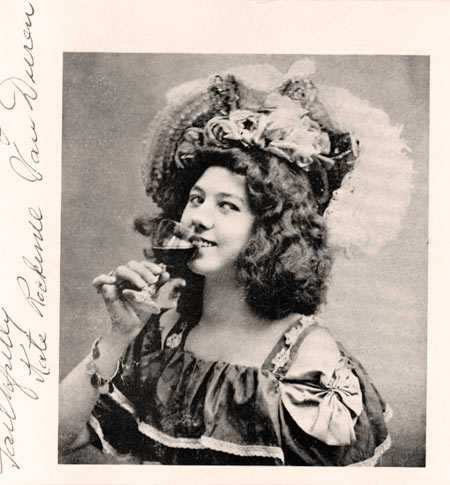
(Klondike Kate, circa 1906 in Dawson. Photo Virtual History)
While I was tapping my toes waiting for the Comcast guy to come last night, “between five and eight” I started to read a great history of the Klondike Gold Rush. It had been sitting on the shelf for a couple years, but my interest was recently piqued by the rebound of the gold exploration industry in the frozen northland.
When I started it, the world was bright, and I was able to sit out on the porch and catch the last of the sun with my shirt off. The life guard was an old guy, apparently another American temp filling the gap since the volcanic ash plume from Iceland has delayed the arrival of the Eastern Europeans who normally rule the Big Pink pool deck through the high summer.
There is another gold rush in progress, for all the usual reasons. Gary Wolf wrote a fabulous article about the new Yukon gold rush in a recent New York Times magazine article. He says what is going on today up in the Northwest Territories of Canada, and across the border in Alaska is the biggest since the Klondike stampede a century ago.
In fact, that is why my sister Annook lives up there. Her husband in the late 1970s got the fever and moved them up to Alaska when inflation was out of control and people thought Krugerrands were the hedge against interest rates that were in the teens.
In 1980, gold was over $800 an ounce. They made a pretty good living for a while working old Klondike claims, shoveling out the tailings the old-timers had left behind and scavenging the nuggets they missed.
There were flush times up there, but with stability the air came out of the bubble and the price per ounce tumbled to below $400.
The whole thing was about fear, of course, as Wolf points out his fascinating profile of the people who stuck it out after inflation was reigned in and gold prices tumbled. Some made a pretty good living in mushrooms, for example, but the gold bugs are back.
As Mr. Bernanke at the Fed keeps interest rates near zero in an attempt to stimulate the economy, the gold bugs are making apocalyptic predictions of what is going to happen to the value of the dollar. Consequently, one of the conventional wisdoms holds that the crushing federal deficit will cause the economy to collapse amid hyperinflation.
The thinking goes that gold will hold its value as the national currencies of America and the EU collapse.
It is an interesting line of reasoning, as we contemplate the abyss. Gold is easily imported, widely traded and the brand recognition is universal. Such renowned intellects as Glen Beck and Laura Ingraham are hawking the noble metal as the “perfect investment for the apocalypse.”
I am getting weary of the end of the world. All the squirrels are out, and like assholes, all of them has an opinion on how this is going to go.
I have to admit that I wish I had climbed on the panic train a long time ago. Gold passed $1,500 an ounce, nearly double the last panic spike level, even though smart guys have been warning that a bubble was being created at the $1,000/oz. level.
Some of the Bugs are talking about $2,000 gold, $5,000 gold, even $10,000 gold.
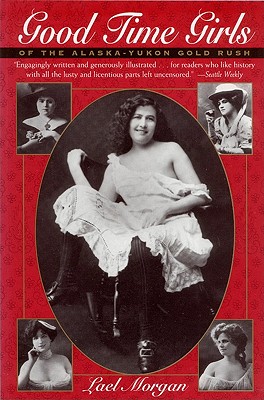
(Good Time Girls, by Lael Morgan.)
Anyway, that is why I pulled down “Good Time Girls” by Lael Morgan, an astonishingly rich 1998 work of research on the ladies of the Klondike Gold Rush.
As it turns out, hookers were the first women to arrive in the goldfields. Since the patriarchy of the day precluded them from hard labor in the field (pants or bloomers were prohibited by force of law, for example) the intrepid ladies of the demimonde simply did the next best thing and “mined the miners.”
The crushingly hard life of women in ordinary life as maids, laundresses or homemakers made the alternative of being a fancy girl a viable career move in the far north, or at least that is the conclusion of Ms Morgan, who spent thirty years looking at the period and its remaining evidence.
As now, fortunes then were made and blown overnight. The most reliable means of securing wealth came from stoking the fever that came with the notion that gold was lying on the ground for the taking, and then peddling goods to the dreamers with the shovels.
I got hooked on the accounts of the hardship of that life, and of the names of the places. Skagway, Nome, Circle City, Forty Mile and Dawson. They say that there were a couple hundred thousand people involved in the stampede, overwhelmingly male, and with real fortunes on the line and a brief summer book-ended by an eight-month winter with temperatures that plunged to -70 degrees below zero.
As I looked up periodically at the clock to see whether I could get my swim in after the Comcast technician came, I had to contemplate that generation of Americans and Canadians who fled the long depression down below and struck out for the goldfields. Ms Morgan describes them like this: “brawny, in their prime, optimistic, happy to be out from under the apron of the Outside.”
Morals and probity under Miner’s law were rough and situational, sort of like Comcast’s version of customer service. As eight o’clock came and went, I put the book aside and sighed. I began the excruciating process of attempting to contact the service desk. You know the drill- eighteen or twenty “press-one-or-four,” on hold, and the finally the story from the operator: “No equipment, so no service.”
“And no notification. You guys have no qualms about Robo-calling me two or three times to ensure I am home.”
“Well, as you know, the time of our technicians is valuable, and for your inconvenience, we are prepared to offer you a $20 dollar credit.”
“Do you know how much gold dust that can buy you?” I asked. Then I made a suggestion as to where the telecommunications giant might insert their credit.
“Thank you for using Comcast,” went the line, like there is a freaking choice.
I knew I could not get a work-out swim in before the pool closed, but a plunge in the cool water might take the edge off my frustration with the communications monopoly. I arrived at 2045, fifteen minutes to go, and saw the gate locked and the lifeguard gone.
“Freaking Americans!” I fumed aloud to Joe and Mary Margaret, who were relaxing in the sweltering darkness on Joe’s patio.
“If you need to find someone who works anymore you have to find a Mexican or a Pole.”
Copyright 2011 Vic Socotra
www.vicsocotra.com
